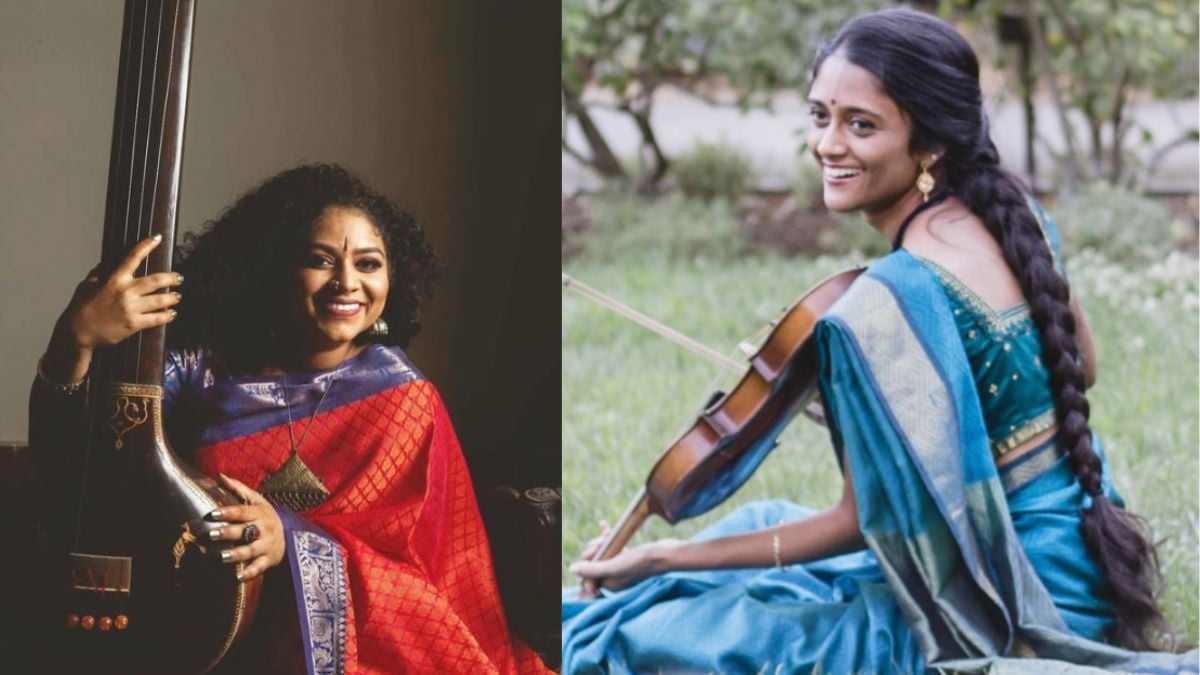“We may have heard of those who came after 1965, the doctors and the engineers,” said a voiceover from Carnatic vocalist Roopa Mahadevan, as archival footage of American streets from the first half of the 20th century played out on the screen. “But who were the earliest among us?”
This is the central question that Mahadevan and Sruti Sarathy explore in Songs for Many Lives, an original Carnatic music project that will premiere for the public sometime next year.
On October 24, they performed a work-in-progress preview of the concert at 477 Minna in San Francisco, for a select group of friends and supporters. Mahadevan and Sarathy are both full-time Carnatic musicians based in the Bay Area and have been working on this project for the past two years, with support from the Creative Work Fund.
Apart from Mahadevan (Carnatic vocals) and Sarathy (Carnatic violin, vocals), Rohan Krishnamurthy was on the mridangam, ghatam, and kanjira; Aniruddh Bharadwaj on flute; and Siddharth Ramalingam on keyboard. A short moderated discussion with Mahadevan and Sarathy followed the performance.
Inspired by Early Desi Immigrants
Songs for Many Lives features seven original Carnatic compositions by Mahadevan and Sarathy, inspired by the lives of early South Asian immigrants to the Bay Area. For the project, they used archival sources like the South Asian American Digital Archive (SAADA), and conducted video interviews with early immigrants to present a mosaic of desi history in the Bay Area.
For instance, the first song Innadu Vande Arinden traces the journey of Dhan Gopal Mukerji, an Indian intellectual who traveled from Calcutta to San Francisco in 1910, and eventually became a prominent voice for the Indian Independence movement in the U.S.
While Tinku’s Wedding Song celebrates the story of Tinku Ishtiaq, a gay Bangladeshi immigrant who married his partner in Berkeley’s Tilden Park in the summer of 1992, Song For A Dead Sister refers to a dark chapter of South Asian history in the Bay Area.
The song is a tribute to Sitha Vemireddy, a teenage girl from Andhra Pradesh who was trafficked to the United States by Berkeley real estate tycoon Lakireddy Balireddy. A victim of caste-based violence, Sitha died from a carbon monoxide leak at one of Balireddy’s properties, where she was held captive.
For the project, Mahadevan and Sarathy also conducted interviews of immigrants like BART Board Director and activist Barnali Ghosh, founder of Hindus for Human Rights Raju Rajagopalan, Tinku Ishtiaq, and musicians Sonny Singh and Yanchan Produced. They showcased clips from these oral histories, along with other archival material to accompany and contextualize the compositions they presented.
Solid Musicianship Coupled with Subversive Composition
Throughout the seven songs, the musicians all demonstrated their mastery over their craft, eliciting a standing ovation from the audience. But the focus is just as much on the compositions and the lyrical content of their songs, as it was on the musicianship.
In a discussion with the audience, Mahadevan and Sarathy explained that through this project, they aim to showcase the diversity and radicality of the South Asian immigrant experience in the Bay Area, a history that stretches back more than a century, when the first wave of desi immigrants came to these shores seeking economic opportunities, education, or a safe haven from oppressive forces at home.
The genesis of the project was the Black Lives Matter protests after the murder of George Floyd in 2020. As an expression of South Asian solidarity with protests, Sarathy penned the song Tedade Maname, which Mahadevan performed through her choir project titled the Navatman Music Collective.
“That got Roopa and me thinking that, maybe there is actually some scope in Carnatic music to talk about things that are not the devotional songs and compositions that are generally from the 1700s, and 1800s in a far-removed time and place,” said Sarathy. “Not that those are not beautiful and meaningful things to engage with, but maybe there was also something else that this music could talk about that was very near to our personal experiences.”
With funding from the Creative Work Fund, and in partnership with the Alliance of South Asians Taking Action (ASATA), Mahadevan and Sarathy then built the project one song at a time, staying true to the form of Carnatic music, but using the lyrical content to tell a story of the South Asian diaspora in the Bay Area. Another subversion was that Sarathy wrote lyrics in not just the South Indian languages typically used in Carnatic music; the concert includes songs written in Bengali, Hindi, and English too.
Project to Premiere in 2025
They both appreciated that their interpretation of this style of music might be divisive among the more conservative elements within the Carnatic music community, but they have not yet performed the work for a mainstream Carnatic audience. After performances in Chicago, Emory University in Georgia, and now San Francisco, the duo are still refining their performance for the premiere, which will be sometime in 2025.
“We’re still kind of testing the waters a little bit,” said Mahadevan. “We’d like to do more [performances], and part of today is also to get your feedback on where you think we need to do this show, who needs to see this, who else could be good partners, and what other stories should we be telling.”
Songs For Many Lives is made possible with the support of the Creative Works Fund and is created in partnership with the Alliance of South Asians Taking Action (ASATA).
(The article is published under a mutual content partnership arrangement between The Free Press Journal and India Currents).
